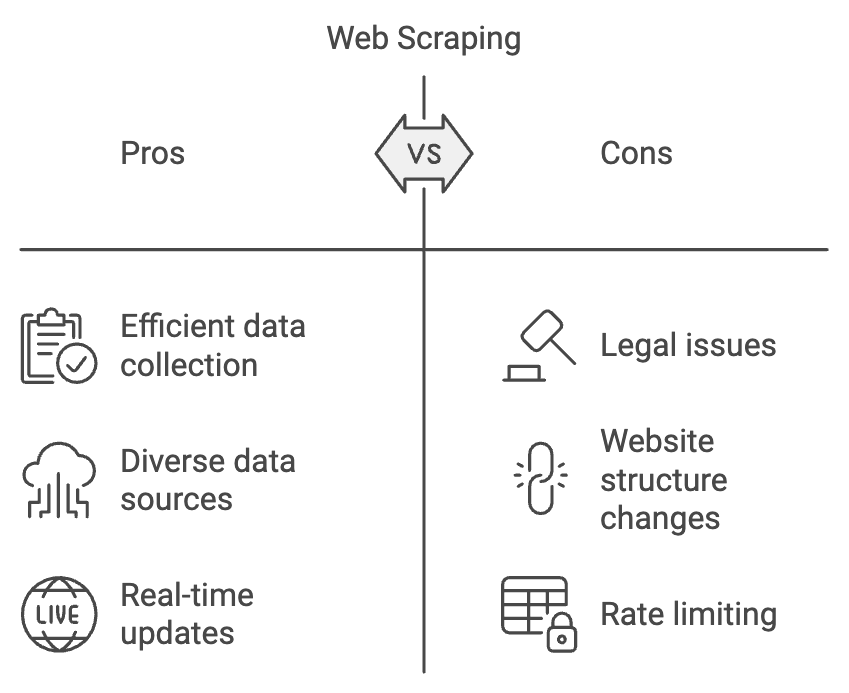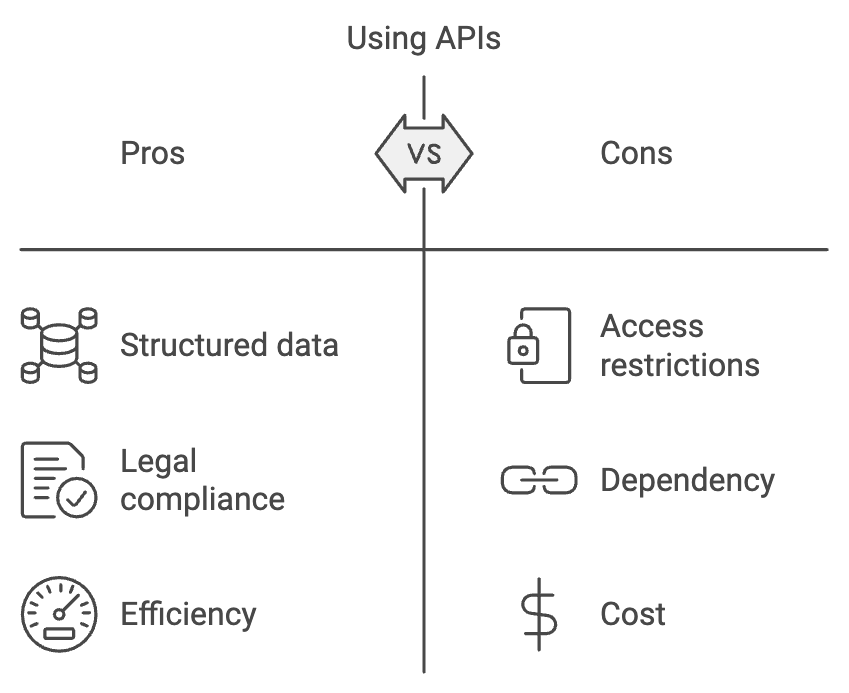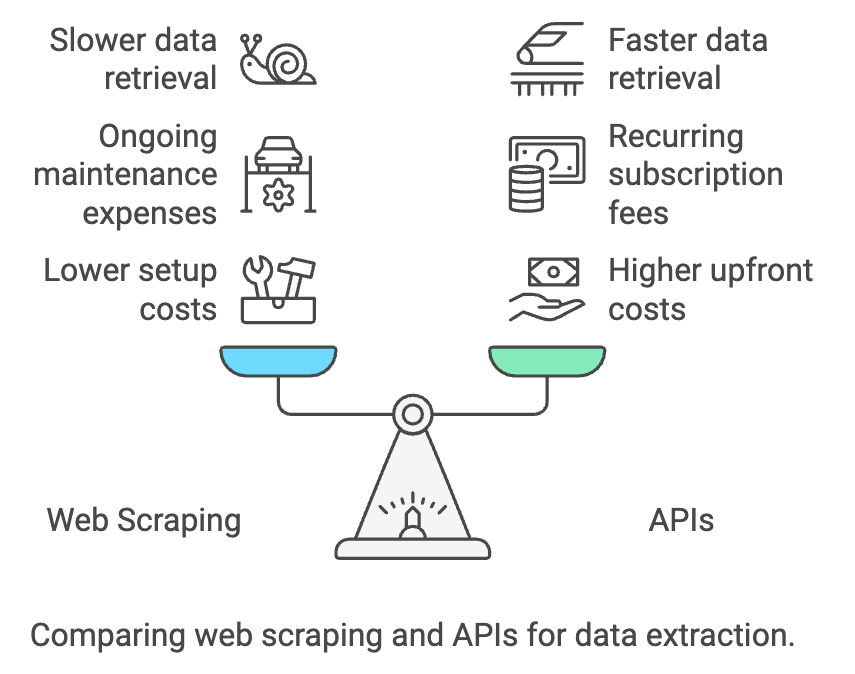Web Scraping vs API: Understanding the Similarities and Differences
Web Scraping Definitions
- Web Scraping: The process of extracting data from websites by parsing HTML content. It can be done manually or through automated tools that simulate user interactions with web pages.
What is Web Scraping?

Web scraping is the automated process of extracting data from websites. By using specialized software, users can gather information from multiple web pages, enabling them to collect large amounts of data efficiently. This method is often employed in various fields, including market research, competitive analysis, and data journalism.
API Definitions
- API (Application Programming Interface): A set of protocols that allows different software applications to communicate with each other, providing structured access to data from a service.
What is an API?

An Application Programming Interface (API) allows different software applications to communicate with each other. APIs provide a set of protocols and tools that enable developers to access specific features or data from another application, typically in a structured manner.
Benefits of Web Scraping
The primary advantages of web scraping include:
- Efficiency: Automating data collection saves time and resources compared to manual data entry.
- Data Diversity: Users can aggregate information from various sources, providing a more comprehensive view of the market or subject matter.
- Real-time Updates: Scraping allows for the continuous collection of data, ensuring that the information is up-to-date.
Disadvantages of Web Scraping
Despite its benefits, web scraping has drawbacks:
- Legal Issues: Many websites have terms of service that prohibit scraping, leading to potential legal repercussions.
- Website Changes: If a website alters its structure, scrapers may break, requiring constant maintenance.
- Rate Limiting: Some websites implement rate limiting to prevent excessive requests, which can hinder data collection.

Benefits of Using an API
Using APIs offers several advantages:
- Structured Data Access: APIs provide data in a consistent and predictable format, making it easier for developers to integrate.
- Legal Compliance: Since APIs are provided by the data owner, using them often avoids legal issues associated with scraping.
- Efficiency: APIs can offer faster data retrieval compared to web scraping, especially if the API is well-designed.
Disadvantages of Using an API
However, APIs also have limitations:
- Access Restrictions: Some APIs require authentication or have usage limits that can restrict data access.
- Dependency: Relying on an API means that changes made by the provider can impact your application.
- Cost: Some APIs charge for access, making them less budget-friendly than scraping in certain scenarios.

Web Scraping vs API: What’s the Similarity?
Both web scraping and APIs aim to retrieve data, albeit using different methods. They can both serve similar purposes, such as data analysis, market research, and competitive intelligence.
Web Scraping vs API: What’s the Difference?
The main difference between web scraping and using an API lies in their methodologies. Web scraping involves extracting data directly from web pages, while APIs provide a structured way to access data. The choice between the two often depends on the specific needs of the project and the availability of data.
Key Differences
| Feature | Web Scraping | API |
|---|---|---|
| Data Access | Can extract any publicly available data | Limited to data provided by the service owner |
| Data Format | Often unstructured; requires parsing | Structured data (e.g., JSON, XML) |
| Speed | Can be slower; depends on website responsiveness | Generally faster; direct access to data |
| Technical Difficulty | High; requires knowledge of HTML and parsing | Moderate; requires understanding of API endpoints |
| Maintenance | High; needs regular updates due to website changes | Lower; APIs are versioned and changes are communicated |
| Legal Considerations | May violate terms of service; risk of being blocked | Typically legal, provided usage adheres to terms |
Cost Analysis
Web Scraping:
- Initial Setup Costs: Often lower due to availability of free, open-source tools.
- Ongoing Expenses:
- Maintenance of scrapers requires continuous effort.
- Adaptation to changes in website structures can incur additional costs.
- Management of anti-scraping measures may require investment in techniques.
- Operational Costs: Extended scraping may need significant server resources, increasing costs.
APIs:
- Subscription Fees: Generally have recurring costs based on provider pricing models.
- Usage Limits: Vary by provider, which can affect budgeting.
- Upfront Costs: Typically higher, but structured data delivery may save time.
- Legal Compliance: Adherence to regulations can reduce risks and potential legal costs.
Performance and Reliability
Web Scraping:
- Speed: Often slower due to reliance on web page loading times.
- Reliability: Less reliable; website structure changes can disrupt scraping.
- Challenges:
- Potential IP bans for excessive requests.
- Rate limits imposed by target websites.
- Interruption Risk: More prone to interruptions during data collection.
APIs:
- Speed: Generally faster due to optimized data retrieval.
- Reliability: More dependable, designed for consistent performance.
- Error Handling: Robust mechanisms in place to manage issues.
- Documentation: Comprehensive resources to assist developers.
Use Cases and Considerations

Organizations should weigh performance factors when choosing between web scraping and APIs based on specific data retrieval needs. Businesses should evaluate their budgets and specific data needs to determine the most cost-effective solution. Both web scraping and APIs have unique costs and benefits, making the choice dependent on organizational goals and resources.
- Choose Web Scraping When:
- Data is needed from websites without an API.
- You require real-time updates or specific formatting not provided by APIs.
- You want to sample data before investing in a more structured solution.
- Choose API When:
- The service provider offers an API that meets your needs.
- You need reliable access to structured data with less maintenance overhead.
- You’re working with sensitive or private data that requires secure access.
Frequently Asked Questions
Does web scraping require an API?
No, web scraping does not require an API; it extracts data directly from websites.
Which API can be used for web scraping?
Several APIs are designed for web scraping, including ScraperAPI, Apify, and Octoparse. Each offers unique features tailored for data extraction.
Is web scraping part of ETL?
Yes, web scraping can be a component of the ETL (Extract, Transform, Load) process, where data is extracted from sources and transformed for analysis.
Conclusion
Both web scraping and APIs offer valuable methods for data retrieval, each with its strengths and weaknesses. If you need broad access to diverse datasets without restrictions, web scraping may be the better option. Conversely, if you seek structured, reliable, and easy-to-maintain data access, leveraging an API is typically more efficient. Consider your project’s goals, budget, and technical capabilities when making your decision.
Our Services
At VERSATEL Networks, we specialize in providing top-notch web scraping services. By harnessing the power of automated data collection, we help businesses gather the information they need efficiently and effectively. Whether you’re looking to analyze market trends or gather competitive intelligence, our web scraping solutions are tailored to meet your specific requirements. Trust us to deliver accurate and timely data to empower your decision-making process.
